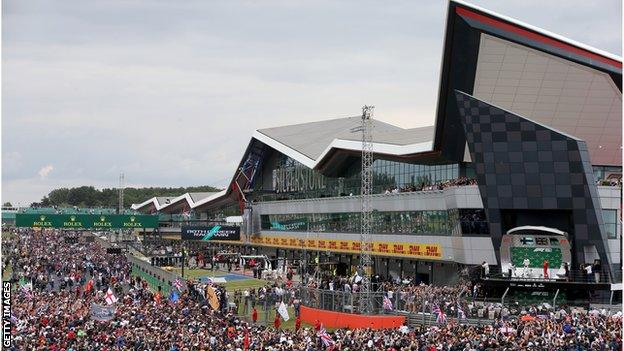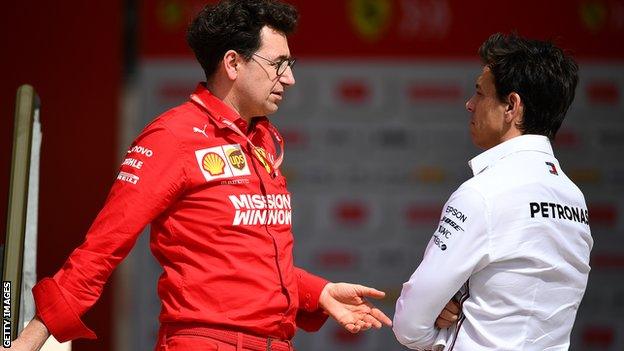Formula 1 discusses Austria season start & two races at Silverstone
- Published

More than 140,000 fans came to Silverstone to watch the British Grand Prix last year
Formula 1's latest plan to get the 2020 season off the ground is to hold the Austrian Grand Prix as scheduled followed by two races at Silverstone.
The first nine races have all been postponed as a result of the global coronavirus crisis and F1 is facing a moving target as it seeks a start date.
But the easing of lockdown restrictions in Austria might mean its race could go ahead on 3-5 July behind closed doors.
It could be followed by two races at Silverstone, also without spectators.
The tentative plan was outlined to teams by F1 bosses at a meeting on Thursday at which proposals to reduce the sport's budget cap to $130m (£104.6m) by 2022 were also discussed.
The proposal to run multiple races at Silverstone is not new - the circuit discussed it with F1 bosses earlier this month.
And any proposal on the calendar depends on external factors, particularly the situation with the spread of coronavirus in each individual country.
F1 bosses have said they do not want to start the season if they cannot carry it on.
Austria this week became one of the first European counties to loosen restrictions, allowing thousands of shops to open, although people are still being advised to work from home if possible.
Meanwhile, the UK government announced on Thursday a three-week extension on its social distancing guidelines, as the virus spread has not yet peaked, while France has banned mass gatherings until mid-July.

Mattia Binotto, left, took over as Ferrari team principal at the start of 2019
What about the budget cap talks?
The meeting broke up without agreement on where to set the budget cap for the next two seasons and beyond, but all sides in the debate described it as positive and constructive.
The main thrust of discussion was a plan to set a cap of $145m (£116.6m) next year and lower it to $130m in 2022.
Other proposals on the rules included a sliding scale of allowance for aerodynamic research, with less successful teams allowed more.
That was an idea put forward by the top teams, who presented it as an elegant way to level the field, in a similar fashion to the draft in American football in the US.
In the NFL, the teams at the bottom of the league are given the first pick of players being promoted from the college game each year.
The idea in F1 would be that the team who finished first in the championship would be allowed to do the least aerodynamic research the following year and the team who finished last the most.
Mercedes, Ferrari and Red Bull had proposed that this should also be linked to the budget cap - so they could spend more money but would be allowed less aerodynamic research.
F1 bosses rejected that idea, preferring a single cap for all teams, but want to push forward with the aerodynamic handicapping system.
Insiders say that it is likely to take several more weeks to come to a final agreement on the level of the budget cap for the next two seasons and beyond.
The discussions have arisen out of an acceptance within F1 that the coronavirus crisis has put the sport in a vulnerable position.
The lack of racing means an inevitable drop in revenue because of the disruption of the sport's main income streams of race-hosting fees, broadcasting rights and sponsorship.
A number of measures have already been adopted, including postponing a major regulation change by a year to 2022 and forcing teams to race the same cars next year as this.
Teams have agreed informally to lower the budget cap to $150m. A cap of $175m (£137.9m) was agreed last autumn and is already in the regulations to be introduced from next season.
Now there is a drive to lower the cap even further, with McLaren arguing that the sport is in "a very fragile state" and that up to four teams could pull out if major changes are not made.
However, Ferrari remain the strongest opponents of lowering of the budget cap below $150m.
They say that Italian law imposes strict restrictions on companies making redundancies, that they will already be forced into significant job losses at $150m and that to go any lower would be a major problem for them.
They also question the wisdom of lowering the cap further for 2022, when the new rules mean that there can be no carryover of parts, so costs will inevitably rise.
An insider from one of the independent teams said they felt the talks were "going in the right direction" and were optimistic of their position prevailing.
But Ferrari continue to emphasise the need to think carefully before taking what they would consider as drastic steps and believe considerably more time should be spent discussion the potential impact of the proposals.